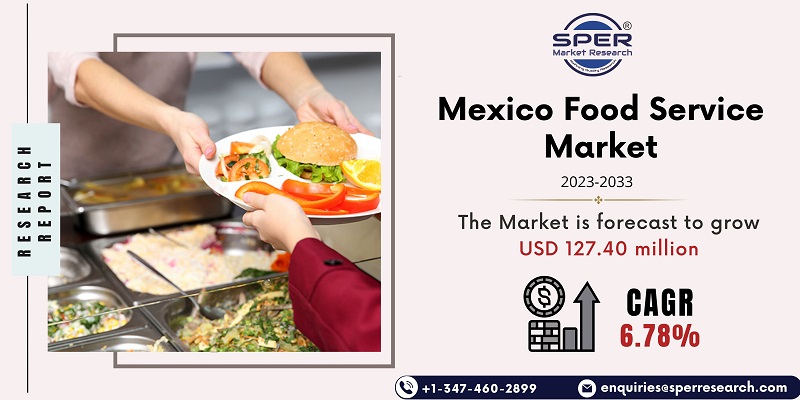
Mexico Food Service Market Growth, Size, Trends, Share, Revenue, Competition and Future Outlook
Mexico Food Service Market Size- By Food Service Type, By Outlet, By Location- Regional Outlook, Competitive Strategies and Segment Forecast to 2033
| Published: Jan-2024 | Report ID: FOOD2405 | Pages: 1 - 103 | Formats*: |
| Category : Food & Beverages | |||
- 2022: Alsea collaborated with Uber Direct to deliver purchases made through the Alsea WOW+ platform and Starbucks Rewards in Mexico within 30 minutes.
- 2022: Papa John's has introduced a new Chorizo pizza line with flavors inspired by the taste of space. The space-inspired pizza menu combines the flavors of Chorizo with Papa John's signature Pizzas, Papadias, and Rolls.


| Report Metric | Details |
| Market size available for years | 2019-2033 |
| Base year considered | 2022 |
| Forecast period | 2023-2033 |
| Segments covered | By Food Service Type, By Outlet, By Location |
| Regions covered | Western Region, Eastern Region, Northern Region, Southern Region |
| Companies Covered | Alsea SAB de CV, Arcos Dorados Holdings Inc., CMR SAB de CV, Domino’s Pizza Inc, Grupo Gigante SAB de CV Little Caesar Enterprises, Starbucks and Yum! Brands Inc. |
- Catering Companies
- Consumers and Food Enthusiasts
- Educational Institutions
- Food and Beverage Managers
- Food Delivery Services
- Franchise Operators
- Hospitality Industry Professionals
- Industry Associations and Trade Groups
| By Food Service Type: |
|
| By Outlet: |
|
| By Location: |
|
- Mexico Food Service Market Size (FY’2023-FY’2033)
- Overview of Mexico Food Service Market
- Segmentation of Mexico Food Service Market By Food Service Type (Cafes & Bars, Cloud Kitchen, Full Service Restaurant, Quick Service Restaurant.)
- Segmentation of Mexico Food Service Market By Outlet (Chained Outlets, Independent Outlets)
- Segmentation of Mexico Food Service Market By Location (Leisure, Lodging, Retail, Standalone, Travel)
- Statistical Snap of Mexico Food Service Market
- Expansion Analysis of Mexico Food Service Market
- Problems and Obstacles in Mexico Food Service Market
- Competitive Landscape in the Mexico Food Service Market
- Impact of COVID-19 and Demonetization on Mexico Food Service Market
- Details on Current Investment in Mexico Food Service Market
- Competitive Analysis of Mexico Food Service Market
- Prominent Players in the Mexico Food Service Market
- SWOT Analysis of Mexico Food Service Market
- Mexico Food Service Market Future Outlook and Projections (FY’2023-FY’2033)
- Recommendations from Analyst
1.1. Scope of the report1.2. Market segment analysis
2.1. Research data source2.1.1. Secondary Data2.1.2. Primary Data2.1.3. SPER’s internal database2.1.4. Premium insight from KOL’s2.2. Market size estimation2.2.1. Top-down and Bottom-up approach2.3. Data triangulation
4.1. Driver, Restraint, Opportunity and Challenges analysis4.1.1. Drivers4.1.2. Restraints4.1.3. Opportunities4.1.4. Challenges4.2. COVID-19 Impacts of the Mexico Food Service Market
5.1. SWOT Analysis5.1.1. Strengths5.1.2. Weaknesses5.1.3. Opportunities5.1.4. Threats5.2. PESTEL Analysis5.2.1. Political Landscape5.2.2. Economic Landscape5.2.3. Social Landscape5.2.4. Technological Landscape5.2.5. Environmental Landscape5.2.6. Legal Landscape5.3. PORTER’s Five Forces5.3.1. Bargaining power of suppliers5.3.2. Bargaining power of buyers5.3.3. Threat of Substitute5.3.4. Threat of new entrant5.3.5. Competitive rivalry5.4. Heat Map Analysis
6.1. Mexico Food Service Market Manufacturing Base Distribution, Sales Area, Product Type6.2. Mergers & Acquisitions, Partnerships, Product Launch, and Collaboration in Mexico Food Service Market
7.1. Mexico Food Service Market Value Share and Forecast, By Food Service Type, 2023-20337.2. Cafes & Bars7.3. Cloud Kitchen7.4. Full Service Restaurants7.5. Quick Service Restaurants
8.1. Mexico Food Service Market Value Share and Forecast, By Outlet, 2023-20338.2. Chained Outlets8.3. Independent Outlets
9.1. Mexico Food Service Market Value Share and Forecast, By Location, 2023-20339.2. Leisure9.3. Lodging9.4. Retail9.5. Standalone9.6. Travel
10.1. Mexico Food Service Market Size and Market Share
11.1. Mexico Food Service Market Size and Market Share By Food Service Type (2019-2026)11.2. Mexico Food Service Market Size and Market Share By Food Service Type (2027-2033)
12.1. Mexico Food Service Market Size and Market Share By Outlet (2019-2026)12.2. Mexico Food Service Market Size and Market Share By Outlet (2027-2033)
13.1. Mexico Food Service Market Size and Market Share By Location (2019-2026)13.2. Mexico Food Service Market Size and Market Share By Location (2027-2033)
14.1. Mexico Food Service Market Size and Market Share By Region (2020-2027)14.2. Mexico Food Service Market Size and Market Share By Region (2027-2033)14.3. Eastern Region14.4. Western Region14.5. Southern Region14.6. Northern Region
15.1. Alsea SAB de CV15.1.1. Company details15.1.2. Financial outlook15.1.3. Product summary15.1.4. Recent developments15.2. Arcos Dorados Holdings Inc.15.2.1. Company details15.2.2. Financial outlook15.2.3. Product summary15.2.4. Recent developments15.3. CMR SAB de CV15.3.1. Company details15.3.2. Financial outlook15.3.3. Product summary15.3.4. Recent developments15.4. Domino’s Pizza15.4.1. Company details15.4.2. Financial outlook15.4.3. Product summary15.4.4. Recent developments15.5. Grupo Gigante SAB de CV15.5.1. Company details15.5.2. Financial outlook15.5.3. Product summary15.5.4. Recent developments15.6. McDonald’s15.6.1. Company details15.6.2. Financial outlook15.6.3. Product summary15.6.4. Recent developments15.7. Little Caesar Enterprises15.7.1. Company details15.7.2. Financial outlook15.7.3. Product summary15.7.4. Recent developments15.8. Yum! Brands Inc15.8.1. Company details15.8.2. Financial outlook15.8.3. Product summary15.8.4. Recent developments15.9. Others
SPER Market Research’s methodology uses great emphasis on primary research to ensure that the market intelligence insights are up to date, reliable and accurate. Primary interviews are done with players involved in each phase of a supply chain to analyze the market forecasting. The secondary research method is used to help you fully understand how the future markets and the spending patterns look likes.
The report is based on in-depth qualitative and quantitative analysis of the Product Market. The quantitative analysis involves the application of various projection and sampling techniques. The qualitative analysis involves primary interviews, surveys, and vendor briefings. The data gathered as a result of these processes are validated through experts opinion. Our research methodology entails an ideal mixture of primary and secondary initiatives.



Frequently Asked Questions About This Report
PLACE AN ORDER
Year End Discount
Sample Report
Pre-Purchase Inquiry
NEED CUSTOMIZATION?
Request CustomizationCALL OR EMAIL US
100% Secure Payment






Related Reports
Our Global Clients
Our data-driven insights have influenced the strategy of 200+ reputed companies across the globe.




















